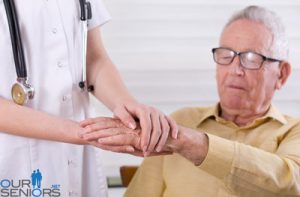 Seniors are subject to a number of special medical problems, one of them being unrecognized dehydration. Dehydration in seniors can sometimes go undiagnosed because the frequent causes of dehydration seen in younger people (excessive physical activity, sweating in hot weather, etc.) are not usually present in seniors; even trained medical personnel can miss the diagnosis.
Seniors are subject to a number of special medical problems, one of them being unrecognized dehydration. Dehydration in seniors can sometimes go undiagnosed because the frequent causes of dehydration seen in younger people (excessive physical activity, sweating in hot weather, etc.) are not usually present in seniors; even trained medical personnel can miss the diagnosis.
Dehydration commonly occurs in people over the age of 65, partly because the symptoms of dehydration are masked by aging. The caretakers in senior assisted living facilities or in-home senior care should be alert to the threat of dehydration in their residents or patients.
Simply put, dehydration is a condition that occurs when the body is losing more water than it is taking in. This might be due to illness, a diminished sense of thirst, reduced kidney function, loss of mobility or to medications like diuretics. At times, seniors are dependent on in-home senior care or workers in senior assisted living facilities who may not realize they are not taking in enough fluids. Emergency response personnel should also be alert to this possibility any time they are involved in a situation involving seniors. Because there are so many retirement communities in Florida, this is even more important in our state.
Sometimes seniors who remain in their own homes, even with good quality in-home senior care, do not drink enough fluid to stay hydrated. One common reason is that deteriorating strength can make it difficult for them to move around. Simply going into the kitchen for a glass of water becomes a great effort. Lack of mobility may lead some to reduce the amounts of fluids they consume so they do not have to urinate as frequently. Friends and family who regularly visit with their loved one may not realize that the person is dehydrated until obvious symptoms appear. Dehydration can cause serious or life-threatening medical issues such as cardiac or renal problems. If the senior already has cardiac or renal disease, they are likely to have more severe problems with even slight dehydration.
Symptoms of Dehydration
The symptoms of dehydration may be more difficult to recognize in older patients because they can mimic other common conditions seen in seniors. Chronic fatigue and lethargy is an early sign of dehydration that may be dismissed as simply ‘getting old.’ As dehydration progresses, muscle strength declines and the patient may develop cramps. Too often, these symptoms are mistaken for signs of aging when lack of sufficient fluid intake is the real cause.
States of confusion are another symptom of dehydration that can be mistaken for normal aging. When in-home senior care professionals or those in senior assisted living facilities see a normally clear-headed senior suddenly appear to be confused, they should suspect dehydration. Increasing fluid intake will relieve these symptoms if they are caused by dehydration. If the symptoms persist after increasing fluids, a visit to the doctor is advisable.
Alert caretakers from in-home senior care providers or those in senior assisted living facilities can do a great deal to prevent dehydration. One of the most important safeguards is to be educated about the medications involved. Many important drugs, especially diuretics, cause an increase in fluid loss. Caretakers should be especially alert to possible dehydration in residents receiving those medications. If possible, the senior’s weight should be checked each day if they are thought to be at risk of dehydration. Body weight monitoring by family or senior assisted living caretakers may warn of developing dehydration; loss of two or more pounds in a short period should cause concern. A simple measure like making bottled water easily within reach may prevent fluid imbalance.
However, senior assisted living caretakers and senior home care professionals must not think that a person who is not thirsty is automatically not dehydrated. With increasing years, people may lose some of the basic senses that we take for granted. The sense of taste and smell as well as the ability to feel hunger or thirst may decline. This decline can contribute to both under nutrition and dehydration sometimes seen in seniors. Again, family caretakers, senior home care professionals and senior assisted living caretakers should be aware of this.
Senior Home Care
Finding high quality senior home care is only one of the challenges faced by seniors, their families and loved ones. These challenges can range from finding a Florida attorney, a Florida CPA or a senior real estate specialist to locating and vetting the best in senior home care or senior assisted living.
At OurSeniors.net, helping seniors and their families to meet these challenges is our core mission. If you or a loved one is facing a move, trying to find senior-sensitive professional advice or to locate senior assisted living, OurSeniors.net can help. We are a complete directory of all-things-senior solutions and opportunities. Please allow us to help.
You can easily contact OurSeniors.net by clicking on Ourseniors.net or by calling our office professionals at 866-333-2657.
